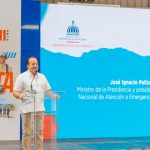Study by the US Embassy to address teachers’ competencies in English

Santo Domingo.- The United States Embassy in Santo Domingo, in collaboration with the Dominican-American Cultural Institute (ICDA), convened the fourth meeting of the working group dedicated to advancing English proficiency in the Dominican Republic. This initiative draws participation from educators, administrators, and stakeholders involved in language instruction across both public and private sectors.
During this session, both entities unveiled a joint project aimed at conducting a comprehensive study to assess the current landscape of English language education. This collaborative effort is being undertaken in partnership with the Dominican Institute for the Evaluation and Research of Educational Quality (IDEICE).
The primary objective, as outlined in a press release, is to gather pertinent data regarding teachers’ linguistic competencies, training, professional development needs, and other contextual and resource-related factors. This endeavor will culminate in a comprehensive report accessible to the national educational community, providing insights into public policies geared towards bolstering English teaching and learning in the Dominican Republic.
Participating representatives from the Ministry of Education (Minerd), the English Immersion Program, the Ministry of Education, Science, and Technology (Mescyt), the Dominican-American Cultural Center in Santiago, as well as institutions such as the Autonomous University of Santo Domingo (UASD), APEC University, and the National Institute of Professional Technical Training (Infotep).
Additionally, IDEICE is actively engaged in this collaborative effort alongside ICDA, working in tandem with both public and private sectors. The project is funded by the United States Embassy in Santo Domingo and benefits from technical collaboration from an American university.
Chelsia Hetrick, Public Affairs Counselor at the United States Embassy, emphasized, “Our objective is to collaboratively establish the groundwork for a comprehensive report that will serve as a roadmap for future national strategies to advance English proficiency.”
Meanwhile, Ramón Sosa, executive director of ICDA, underscored the societal value of bilingualism for the Dominican Republic.
The forthcoming meeting of the working group will focus on presenting the progress and initial findings of this study to the national educational community.
















